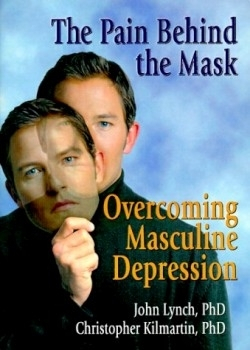The Pain Behind the Mask
Overcoming Masculine Depression
The statistics are staggering: “In the United States, males commit suicide four times more often than females….divorced men are hospitalized at eight times the rate of married men”… “Men also die an average of seven years earlier than women.” So write the authors, Lynch and Kilmartin, in their new work, The Pain Behind the Mask.
The authors, both clinical psychologists, draw from their clinical work with patients and a thorough review of the research in this important look at how depression effects men. Their discoveries have profound implications for males of all ages and should be of interest to fathers, therapists, counselors, coaches and anyone concerned about the needs of men and boys.
Lynch and Kilmartin write a detailed exposition of the social and psychological factors that lead to “masculine depression,” and strategies for treatment and prevention. The core of their work rests on the observation that the standard psychiatric criteria for diagnosing depression is skewed toward the typically feminine expression of the disorder, and men therefor are significantly under-diagnosed. The authors say that females tend to “act-in” the symptoms by expressing feelings of sadness, hopelessness, etc.; while males tend to “act-out” the symptoms by dissociating or disconnecting from their feelings and engaging in destructive behaviors in relationships. This “dissociation and destructive behavior” is thought to be the result of rigid gender-based learning and the cause of myriad ills from domestic violence to suicide to a shortened life expectancy for men.
While roughly the first half of the book lays out the problem, the second half presents solutions. The solutions are based on learning new relational skills grounded in empathy.The authors succeed in clearly presenting this complex material with a minimum of technical jargon. Topics are broken down into bite-sized pieces set off by leading questions in bold-faced type. This approach works to keep things clear, but it does make for somewhat laborious reading. It is, after all, a scholarly self-help book, replete with references footnoted chapter by chapter.
This book is targeted for men of both the scholarly and everyday persuasion, because the authors firmly believe that only men are in position to challenge the problems presented by the traditional masculine prohibition of full emotional expression. They make a strong case for their beliefs and offer valuable guidance for improving the health and happiness of the first sex.
Reviewed by
Steven Holl
Disclosure: This article is not an endorsement, but a review. The publisher of this book provided free copies of the book to have their book reviewed by a professional reviewer. No fee was paid by the publisher for this review. Foreword Reviews only recommends books that we love. Foreword Magazine, Inc. is disclosing this in accordance with the Federal Trade Commission’s 16 CFR, Part 255.

